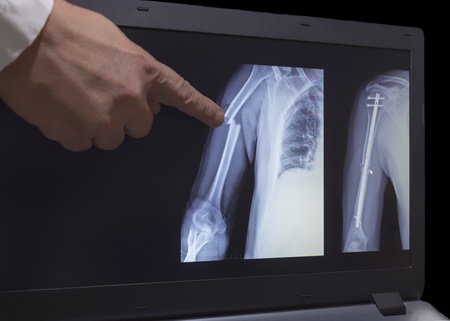Data scientists at the University of Aberdeen have been chosen to participate in a landmark project to develop artificial intelligence (AI) solutions to support fracture diagnosis in hospitals.
The project, led by Opportunity North East (ONE) and the Scottish Government, will see up to £240,000 invested in innovative data technology.
The University’s Department of Computing Sciences was among five organisations selected from a field of 40 participants in a two-phase Small Business Research Initiative (SBRI) competition, supported by Innovate UK, earlier this year. The others include Bering Limited, Red Star AI Limited, SeeAI, and Jiva.ai Ltd.
Each organisation will receive £20,000 over the first phase of the programme, to be delivered over a 12-week period.
This will result in a feasibility study to create AI or machine learning algorithms that will interpret data from upper limb (wrist or hand) and lower limb (ankle or foot) radiographs to diagnose fractures in unscheduled care facilities, such as accident and emergency departments.
Each organisation will be working alongside NHS Grampian, Canon Medical Research Europe, and will utilise the University of Aberdeen’s secure data storage facilities and Maxwell, the University’s High Performance Computing system.
Two organisations will then be selected from the five to progress to the second phase of the programme – prototype development and testing – receiving £70,000 each over a 9-month period.
Professor Nir Oren, Head of the Department of Computing Science, is leading the University’s work on the use of AI for fracture diagnosis.
He said: “This is an exciting project that will leverage synergies between our cutting-edge Machine Learning and AI research, the University’s High Performance Computing system, and secure data storage facilities via the Grampian Data Safe Haven. We look forward to our work having a significant impact on front-line clinical decision making.”
Professor Corri Black, Director of Aberdeen Centre for Health Data Science added: “The Aberdeen Centre for Health Data Science at the University of Aberdeen is delighted to be supporting this exciting partnership between industry, academia and the NHS to improve patient care.
“We look forward to supporting the industry collaborations to work with key partners in Aberdeen to develop their projects and to use our secure data research and innovation facilities within the Grampian Data Safe Haven.”
Professor Stephen Logan, Chair of the ONE Life Sciences sector board commented: “By harnessing the expertise of clinicians and industry, this project will develop innovative AI solutions which will not only help clinicians to make quicker patient diagnoses and treatment decisions, but also enhance patient care. It is vital in achieving ONE’s ambition of developing a Life Sciences cluster in the North East of Scotland that is recognised – nationally and internationally – as a centre of excellence for biologics, imaging and digital and we are delighted to be driving this initiative forward with Scottish Government and our key partners.”
Scottish Government Chief Scientist (Health and Social Care) Professor David Crossman said: “Well done to the five applicants who will be now innovating with the NHS, academics and industrialists to develop AI algorithms to better diagnose fractures. By removing routine activity from radiologists’ busy workloads, we will free up capacity for those patients with the most complex medical need for diagnosis.”
Dr Andy Keen, NHS Grampian Clinical Lead for Innovation, said: "We are excited to see what the five organisations selected will bring in the next stage of this SBRI competition. To have had forty industry partners come forward in the initial call to generate a solution that speeds up fracture diagnosis, is very encouraging. This is the first example of a programme of work focused on using digital technology to improve healthcare delivery at source."
Dr Ken Sutherland, President at Canon Medical Research Europe, said: “Many of Canon Medical’s global network of customers are struggling to cope with ever-increasing demands for good quality healthcare. At Canon Medical, we’re committed to rapidly introducing new technology to help our partners automate aspects of their workflows allowing clinicians to focus on delivering more good quality care. Through this project Canon Medical intend to take AI innovation proven in Scotland to a global market helping Scottish SMEs to grow while at the same time improving healthcare outcomes for all.“


